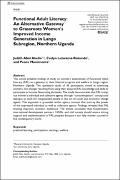| dc.contributor.author | Akello, Judith Abal | |
| dc.contributor.author | Lutwama-Rukundo, Evelyn | |
| dc.contributor.author | Musiimenta, Peace | |
| dc.date.accessioned | 2019-08-08T13:09:07Z | |
| dc.date.available | 2019-08-08T13:09:07Z | |
| dc.date.issued | 2017 | |
| dc.identifier.citation | Akello, J. A., Lutwama-Rukundo, E., & Musiimenta, P. (2017). Functional adult literacy: An alternative gateway to grassroots women’s improved income generation in Lango Subregion, Northern Uganda. Adult Education Quarterly, 67(2), 79-96. | en_US |
| dc.identifier.uri | https://hdl.handle.net/123456789/46 | |
| dc.description.abstract | This article presents findings of study on women’s experiences of Functional Adult Literacy (FAL) as a gateway to their financial progress and welfare in Lango region, Northern Uganda. The qualitative study of 45 participants aimed at examining women’s live changes resulting from using their acquired FAL knowledge and skills to participate in Income Generating Activities. The study demonstrates that FAL brings out women’s individual and collective agency through “conscientization” concept and dialogue as tools for marginalized people in the act of social and economic change agents. This argument is grounded within agency concept that portray the power of the oppressed individual as well as collective agency. Findings revealed that FAL training improves women’s livelihood. The article concludes that Government, international development partners, NGOs, and civil society should ensure strong support and implementation of FAL program because it can help women succeed in the contemporary world. | en_US |
| dc.language.iso | en | en_US |
| dc.publisher | Sage | en_US |
| dc.subject | Practical learning | en_US |
| dc.subject | Participation | en_US |
| dc.subject | Earnings | en_US |
| dc.subject | Welfare | en_US |
| dc.title | Functional Adult Literacy: An Alternative Gateway to Grassroots Women’s Improved Income Generation in Lango Subregion, Northern Uganda | en_US |
| dc.type | Article | en_US |

